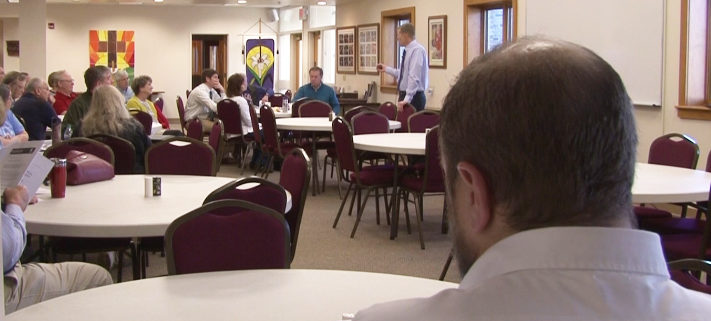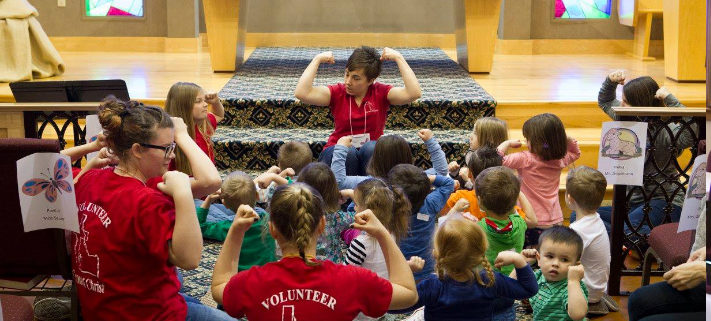Rejoice, pray, and give thanks
A father and daughter journey on similar roads from trouble to recovery.
Rachel A. Hartman
On March 15, 2015, Rebekah Wahl went to visit her father, Roger Wahl, pastor at Zion, Cambria, Wis. He was in a room at the UW Hospital in Madison, Wis., and was staying there while receiving chemotherapy. Earlier that month, he had been diagnosed with leukemia. They both enjoyed the time together.
Perhaps the most remarkable part of the visit was that Rebekah didn’t have to travel far to see her father. In fact, she was staying in the same hospital, recovering from brain surgery. Her trip to her dad’s room marked the first time she had left the Intensive Care Unit in nearly four weeks.
Rebekah had been diagnosed in February with a cancerous brain tumor. Just a month after her diagnosis, her dad faced his battle with leukemia. They ended up in the same hospital where the two of them started down a long road to recovery. It’s been a journey with a few twists and turns for both of them.
CHANGING TIMES
Roger and his wife, Vicki, first met in Kenton, Ohio, where they both attended Grace Lutheran Church. Their paths went in different directions only to converge again in Milwaukee. He was carrying out his vicar year, and she was student teaching. They were married in 1977 and blessed with six children.
Rebekah was their third child and chose to study at Martin Luther College to be a teacher. After graduating, she was assigned to Trinity Lutheran School in Hoskins, Nebraska.
After almost a decade of teaching, she began to feel sick. In spite of many doctor visits, the tests she underwent didn’t reveal a cause. She started the 2014–15 school year but continued to lose weight. By Christmas she had lost 40 pounds and found it difficult to eat or drink anything without feeling nauseous. After another month the congregation gave her a medical leave of absence to concentrate on her health. She came home to stay with her parents in Cambria.
While there, Rebekah visited a local doctor who knew her. He recommended an MRI of the brain. The results showed a brain tumor. The next month, Rebekah underwent a long surgery to remove the tumor, which was cancerous.
“At first they thought it would be three to five days in intensive care,” recalls Vicki. “She was so thin and malnourished that there were many complications.” At her lowest, Rebekah weighed just 76 pounds.
A couple of days after the surgery, Rebekah was no longer able to breathe on her own, so doctors inserted a breathing tube into her throat. She also received a feeding tube for nourishment. But complications continued to create difficulties. Five more surgeries followed. Recovery was complicated by unexplained fevers and infections. In all, Rebekah remained in intensive care for two full months.
FURTHER ILLNESS
A month after Rebekah entered the hospital, Roger felt sick. Concerned about passing any sort of infection to his daughter, he visited a doctor, and after several tests, was diagnosed with leukemia. It was his turn to enter the hospital for two rounds of chemotherapy.
At the same hospital, the two shared several visits. When Roger’s chemotherapy ended, he returned home to recover. Rebekah moved too. She was transferred to a rehab hospital in Milwaukee.
While recovering at home, Roger recalls “We learned that unless something was done for me, the leukemia would almost certainly return with a vengeance.” After looking through the available options, the family decided he would go through a bone marrow transplant to reduce the risk of the leukemia coming back.
Roger’s sister, Margaret Dietrich, turned out to be a perfect match. “I returned to the hospital for a bone marrow transplant,” he explained. “That went well, with mainly just minor side effects from the chemotherapy.” It was another step on the journey that finally brought him home to recover again.
Rebekah’s journey moved forward too. She made progress at the rehab hospital and needed less hospital care. She was transferred to a brain injury center that was a 40-minute drive from the family’s home in Cambria.
A TIME TO HEAL
Their journey brought them both a time to heal. Roger’s health remained stable, and he continued to move toward recovery but with some complications. Among them he experienced trouble with blurry vision, making it impossible for him to drive at night.
Rebekah continued to recover through the fall, making slow progress. She went from not being able to talk, sit up, or eat on her own to gaining enough strength to speak, move again, and, eventually, eat on her own as well.
But the year of trials was not over yet. Rebekah learned the cancer had started to regrow. Radiation was able to remove the cancer again. She continued to make improvements, including starting to use a walker. She even visited classrooms at a nearby WELS elementary school to read books to the children there.
GIVING THANKS
During the family’s health struggles, Tim, Roger’s son and Rebekah’s brother, maintained a Caring Bridge site for both his sister and father. On the sites, he posted updates to keep family and friends informed along with Bible passages and words of comfort.
Vicki, notes, “We have had so many WELS members we have never met leave comments. These fellow Christians have been so supportive, sharing Bible passages, kind words, and prayers.”
The family has received encouragement in many others ways as well. “I’m thankful to God for the gifts of love, like shopping cards, a benefit for Rebekah in Hoskins, and one for our family from Trinity in Friesland and Zion, Cambria, congregations,” notes Roger.
He continues, “The experience for my family and me, while full of earthly woe, has also had a tremendous positive side. It has had an impact on our prayer life. By that, I mean my personal prayer life, my family’s prayer life, our congregation’s prayer life, and the prayer life of Rebekah and our many friends.”
Roger initially took a leave of absence when diagnosed with leukemia. The road to recovery meant that he has been able to carry out some Bible studies and preaching duties. He is thankful that his congregation has provided his family a place to live during his health issues as well as support for himself and a vacancy pastor.
While Roger and his family don’t know what the future holds, they are confident that God will provide for them in the days ahead as he has in the past. “We recognize that we have been blessed,” he notes. He and his family are thankful for the gifts of life, both earthly and eternal. They are also grateful for the gift of faith that continues to sustain them as well as for opportunities for that faith to grow.
“We have learned to look to God more often for strength, hope, and comfort,” Roger adds. “Today I can say, ‘Thank you, God, for everything.’ ”
Rachel Hartman and her husband, Missionary Michael Hartman, serve in León, Mexico.
SUBMIT YOUR STORY
Do you have a manuscript, idea, or story from your own life you’d like to share for use in Forward in Christ or on wels.net? Use our online form to share it to our editorial office for consideration.
SUBSCRIBE TO FORWARD IN CHRIST
Get inspirational stories, spiritual help, and synod news from Forward in Christ every month. Print and digital subscriptions are available from Northwestern Publishing House.
Author: Rachel A. Hartman
Volume 103, Number 6
Issue: June 2016
Copyrighted by WELS Forward in Christ © 2021
Forward in Christ grants permission for any original article (not a reprint) to be printed for use in a WELS church, school, or organization, provided that it is distributed free and indicate Forward in Christ as the source. Images may not be reproduced except in the context of its article. Contact us






